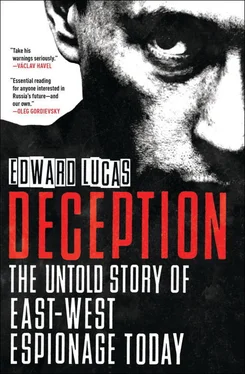The harshest fate awaits those who try active opposition. Demonstrators for causes that displease the Kremlin risk arrest. A stark example of this is the protestors who gather on the 31st of the month (when it happens) to defend Article 31 of the Russian constitution, which guarantees freedom of assembly. Apparently oblivious to the irony, police haul them away: punishing those demonstrating for the right to demonstrate. The FSB and other organs of state power have closed down independent public life in Russia. They have intimidated journalists (and even bloggers); they bully trade unionists; they infiltrate and disrupt opposition parties. The threat of Soviet-style coercive psychiatric treatment is in the background (and sometimes even the foreground) during interrogations. All critics of the regime count as potential ‘extremists’, and ‘extremism’ is a criminal offence, punishable in some cases by the death penalty. In July 2010 the FSB gained new rights to issue warnings to individuals, organisations, and media outlets to stop activities it considers actually or potentially extremist.
A full account of the misrule that results would take a whole book, with full chapters, rather than just fleeting mentions, for subjects such as the mistreatment of the country’s millions of migrant workers. [17] q Mostly from other bits of the former Soviet Union, they are habitually cheated, abused and on occasion murdered, by their employers, or by the police, or by thuggish political extremists.
Most of the worst abuses happen in the republics of the North Caucasus, such as Chechnya, Ingushetia and Dagestan, where the authorities are struggling to maintain control amid a growing insurgency from Islamist groups and others infuriated by their corrupt and incompetent rulers. But the noxious cocktail there poisons public life in Moscow too. A signal example of this came with the murder in January 2009 of Stanislav Markelov, a leading human rights lawyer who had represented many victims of abuse in Chechnya. The men who gunned him down in the middle of Moscow in broad daylight also killed a young journalist, Anastasia Baburova. So hardened is international public opinion to the regime’s habitual use of violence against its opponents that other cases barely attract attention. In March 2009 Lev Ponamarov, a leading human-rights activist, was severely beaten. This appears to have been a snub to a visiting European human-rights representative, Sabine Leutheusser-Schnarrenberger, whom he had just met. In July, Albert Pchelintsev, an anti-corruption activist, was shot with a stun gun, by attackers who told him that it was to ‘shut him up’. Natalya Estemirova, the leading campaigner and researcher in Chechnya for Memorial, the oldest and best-known Russian human-rights organisation, was abducted and murdered in July 2009. The Chechen president Ramzan Kadyrov said callously that he would not have bothered to murder a woman ‘devoid of honour, merit and conscience’. Oleg Orlov, chairman of Memorial, accused Mr Kadyrov of ‘political responsibility’ for the killing and was then prosecuted for criminal slander (he was acquitted in June 2011). 1The investigative journalist Oleg Kashin received a crippling beating in November 2010.
These killings, assaults and other forms of intimidation often bear the FSB’s fingerprints. It makes no difference when other Russian authorities condemn the lawlessness. Mr Medvedev, for example, repeatedly denounced corruption and what he memorably termed ‘legal nihilism’. Yet for the most part, the Russian president was part of the problem, not of the solution. It was he, for example, who in August 2010 signed into law the FSB’s new powers to issue intimidatory warnings. Human Rights Watch states in its most recent report that the climate remains ‘deeply negative’, with only rhetorical commitments to human rights and the rule of law. 2
Those who seek the secrets of the regime are at even greater danger. Russian journalists who turn over such stones risk violent attacks or death. Foreign journalistic inquiry too has become far harder over the past ten years as the regime and its business cronies have discovered England’s tough and far-reaching libel law. Finding source material is tricky. The paper trail often goes cold in places such as the British Virgin Islands, which blocks outsiders from finding the ultimate beneficial ownership of the companies registered there. But the greed and cynicism of supposedly more reputable countries in dealing with dubious but tempting customers is if anything worse. 3
Even in America, Britain and Continental European countries that claim to shun crime and corruption, officials are unwilling to speak out publicly about the sea of dirty Russian money that swills through property markets, banking systems, financial exchanges and (increasingly) politics. In the course of an important investigation I appealed to a well-placed Western official to help me see some crucial documents. He responded: ‘We would love to help you, but however discreetly we do it, the Russians will find out. And they will take it as a declaration of war.’ A Finnish official, faced with a specific request that could have cast a damning light on a senior Russian figure’s behaviour, answered: ‘Good luck. But we can’t help you. That’s why we’re still here’. Such coyness stems only partly from prudence. Some officials have personal financial reasons for going easy on Russia: a lucrative directorship may be awaiting them when they leave government service. Others fear more generally that moral grandstanding will be bad for business; some feel that criticism of Russia is selective and even hypocritical, given the corruption and misrule in other countries, not least in the West.
These perceptions are changing, albeit slowly. Russia’s reputation as a promising emerging market looks increasingly hollow, as other competitors for foreign trade and investment do better. Russia’s place in the BRIC group – Brazil, Russia, India and China – is now largely nominal, as the other three countries forge ahead. Closer to home, the smaller but more advanced states of Central Europe have outstripped Russia in importance. The Czech Republic, with a population of only 10m people, buys more German exports than Russia with 140m people. Even including oil and gas, Poland is now a substantially bigger trading partner for Germany than Russia. 4
Yet declining importance does not mean irrelevance, and few European leaders are willing to contemplate a real confrontation. They argue that many places are worse run than Russia, which does not look like a rogue state, or even a particularly threatening one. They also note that Russia, for its part, does not want a confrontation either. Having indulged in Soviet symbolism and nostalgia at the start of his time in power (when he described the USSR’s collapse as the ‘geopolitical catastrophe’ of the last century, and reinstated the tune of the Soviet national anthem) Mr Putin switched tack. Russia has mended fences with neighbours such as Poland, expressing sympathy for the victims of Soviet-era crimes such as the Hitler–Stalin Pact and the wartime Katyń massacre of captured Polish officers, and in some cases explicitly repudiating the lies surrounding those crimes, which had only lately been making a revolting comeback.
Russia has also in large part signed up to the rules of the international game (though it may not always obey them). It has negotiated with seeming sincerity to join outfits such as the Organisation for Economic Cooperation and Development (a rich-world think-tank in Paris) and the World Trade Organisation, which regulates global trade. Many leading members of Russia’s government, especially those dealing with financial and economic policy, look no worse and in some ways rather better than their counterparts in other ex-communist countries. As Daniel Treisman, an American academic, argues, Russia is no more messily ruled than other middle-income countries such as Mexico or Turkey. 5Rigged elections, manipulated media, high-level corruption and abuse of state power are unpleasant phenomena, but sadly not rare ones. Russia’s legal system sometimes works – especially in cases that, unlike Mr Magnitsky’s, do not involve the interests of the rich and powerful. Charities and pressure groups can function with only mild difficulties so long as they stay away from taboo areas such as Chechnya. Elections in the provinces sometimes yield surprising results that annoy the country’s leaders. It has a degree of media freedom (chiefly on the internet and in small-circulation publications). Emigration provides an important safety valve: unlike in the Soviet era, if you don’t like it, you can leave. The state expects little of its citizens, and vice versa.
Читать дальше












